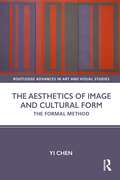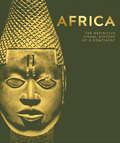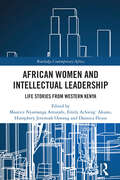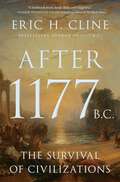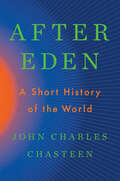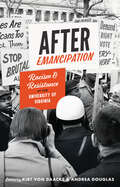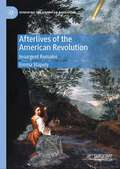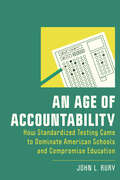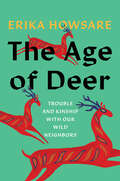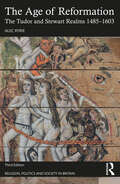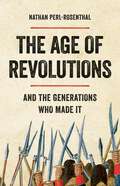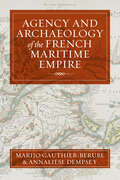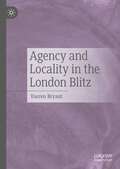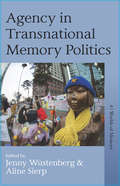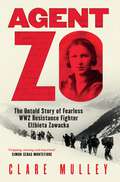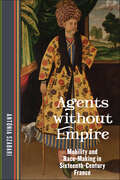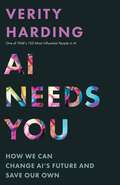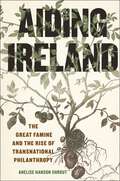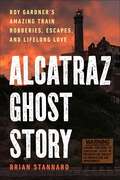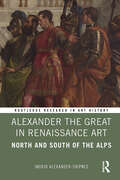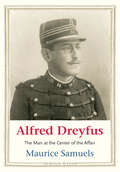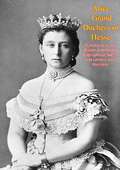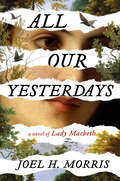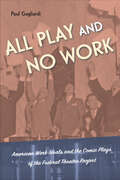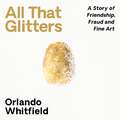- Table View
- List View
The Aesthetics of Image and Cultural Form: The Formal Method (Routledge Advances in Art and Visual Studies)
by Yi ChenOffering an alternative mode of visual cultural analysis to the prevalent discursive model, this book proposes to situate analysis of Image within ‘formal’ analyses of culture experience.Specifically, the discussion draws on theories of affective aesthetics with the view of addressing the sensual form of culture (i.e. ‘cultural form’). Therefore, the volume puts forward a mode of formalist analysis in visual cultural research which takes purchase on the idea of ‘cultural form’. A continuum of formalist attention between Image analysis (visual media, industrial design) and probing of ‘cultural forms’ establishes the theoretical underpinning of the book. These concepts are expounded through a case study which looks at formal experimentations and debates arising from 1960s avant-garde artistic practices in London.
Africa: The Definitive Visual History of a Continent (DK Definitive Visual Histories)
by DKImmerse yourself in Africa's vast and intricate story and discover Africa&’s true place in world history.Spanning more than 200,000 years, from the emergence of the first humans to the rise of megacities, Africa explores the history and cultures of the world&’s second-largest continent in vivid detail. It brings to life the stories that shaped Africa and the world around it, from powerful and influential empires and kingdoms such as Mali and Benin, through the struggle against colonization and the fight for independence to Africa&’s place on the global stage today.You will meet some of Africa&’s most important political and military leaders, including Hannibal, Mansa Musa, Oba Ewuare, Queen Nzinga, Kwame Nkrumah, Nelson Mandela, and Ellen Sirleaf. Brilliant photography showcases the great art and architecture that African civilizations have created while engaging text written by experts of African heritage covers every facet of African cultures, from music and literature to oral traditions and languages. Specially commissioned CGI artworks recreate iconic buildings and life in lost cities like Timbuktu and Great Zimbabwe.Explore the pages of this awe-inspiring African history book to discover: -The whol-e story of the African continent, covering every aspect from culture and trade to politics and society-The chapters explore developments in religion, languages, music, literature, and mythology.-Biography sections portray the lives, impact, and legacy of influential figures in African history.-Detailed maps set the main sites in context and showcase vast empires and key trade routes-Optional 80-page reference section provides a directory of the histories and cultures of all the sovereign states in Africa.Beautifully illustrated and unparalleled in scope, Africa is the perfect book for anyone looking to deepen their understanding of Africa&’s vital and inspiring history.
African Women and Intellectual Leadership: Life Stories from Western Kenya (ISSN)
by Maurice Nyamanga Amutabi Emily Achieng’ Akuno Humphrey Jeremiah Ojwang Dannica FleussThis book highlights the pioneering roles of African women as leaders and role models in Kenya, providing examples taken from across education, health, business, and a range of other sectors. Drawing on authentic first-hand accounts and narratives from key women in leadership positions, and those who have lived with them, the book presents the life stories of women leaders over the last fifty years, aiming to preserve their contributions for posterity and to inspire young people with moral, ethical, and progressive role models. The book uses African knowledge production strategies that look at the human being holistically, in the prism of Ubuntu, in order to define leadership in Africa from an African perspective, one that celebrates the role of the mother figure and places women at the centre of African values and societal dynamics. This book will be of interest to researchers and students of African studies, gender studies, and Kenyan education and socio-political history.
After 1177 B.C.: The Survival of Civilizations (Turning Points in Ancient History #12)
by Eric H. ClineIn this gripping sequel to his bestselling 1177 B.C., Eric Cline tells the story of what happened after the Bronze Age collapsed—why some civilizations endured, why some gave way to new ones, and why some disappeared forever&“A landmark book: lucid, deep, and insightful. . . . You cannot understand human civilization and self-organization without studying what happened on, before, and after 1177 B.C.&”—Nassim Nicholas Taleb, bestselling author of The Black SwanAt the end of the acclaimed history 1177 B.C., many of the Late Bronze Age civilizations of the Aegean and Eastern Mediterranean lay in ruins, undone by invasion, revolt, natural disasters, famine, and the demise of international trade. An interconnected world that had boasted major empires and societies, relative peace, robust commerce, and monumental architecture was lost and the so-called First Dark Age had begun. Now, in After 1177 B.C., Eric Cline tells the compelling story of what happened next, over four centuries, across the Aegean and Eastern Mediterranean world. It is a story of resilience, transformation, and success, as well as failures, in an age of chaos and reconfiguration.After 1177 B.C. tells how the collapse of powerful Late Bronze Age civilizations created new circumstances to which people and societies had to adapt. Those that failed to adjust disappeared from the world stage, while others transformed themselves, resulting in a new world order that included Phoenicians, Philistines, Israelites, Neo-Hittites, Neo-Assyrians, and Neo-Babylonians. Taking the story up to the resurgence of Greece marked by the first Olympic Games in 776 B.C., the book also describes how world-changing innovations such as the use of iron and the alphabet emerged amid the chaos.Filled with lessons for today's world about why some societies survive massive shocks while others do not, After 1177 B.C. reveals why this period, far from being the First Dark Age, was a new age with new inventions and new opportunities.
After Eden: A Short History of the World
by John Charles ChasteenTo solve the problems of the twenty-first century, historian John Charles Chasteen argues that we must first know our shared human story. In After Eden, prominent Latin American historian John Charles Chasteen provided a concise history of the world, in which he explores the origins and persistence of the timeless phenomena of humanity’s inhumanity to itself. Where did it come from? Why has it been so prevalent throughout our history? And, most importantly, can we overcome it? Chasteen argues that to do so, we must understand our shared past. While much of that past is violent, we can look for inspiration from major periods when we strived to live more cooperatively, such as our early foraging periods, to the creation of universal religions and ethical systems, the birth of the ideas of individual liberty and freedom, the rise of socialism in response to the massive excesses of global capitalism, the civil rights and decolonization movements of the twentieth century, to the environmental and social justice movements of today. Once we understand who and what we are as a species and a people, we will be in the best position to figure out how to work together to tackle the greatest challenges we face today—mass global inequality and the destruction of our environment. Fully informed by the latest scholarship, After Eden presents a down-to earth, fast-paced narrative of world history, animated by stories of people from all walks of life and enriched by insightful analysis and the author’s extensive world travel.
After Emancipation: Racism and Resistance at the University of Virginia (The American South Series)
Assessing a university&’s legacy in the age of segregation This anthology reckons with the University of Virginia&’s post-emancipation history of racial exploitation. Its fifteen essays highlight the many forms of marginalization and domination at Virginia&’s once all-white flagship university to uncover the patriarchal, nativist, and elitist assumptions that shaped university culture through the late nineteenth century and well into the twentieth. Including community responses ranging from personal reflections to interviews with local leaders to poems, this accessible volume will be essential reading for anyone with ties to UVA or to Charlottesville, as well as for anyone concerned with the legacy of slavery and segregation in America&’s universities.
Afterlives of the American Revolution: Insurgent Remains (Renewing the American Narrative)
by Emma StapelyThis book challenges the historical common sense that the American Revolution terminated in the birth of the United States. Prevailing narratives of the Revolutionary period rest on the assumption that the war ended with the Treaty of Paris in 1783. Yet from London to Philadelphia, and from the Six Nations’ trans-Appalachian homelands to the shores of Sierra Leone, the decades after the treaty’s signing roil with accounts that disturb the coherence of this chronological division. Insurgent Remains assembles a counter-archive of textual and visual materials—ranging from popular seduction tales and political cartoons to the writings of self-liberated African Americans—that furnishes alternative visions of revolutionary historical experience as an ongoing negotiation with violence and contingency. The book argues that the minor temporalities and political literacies registered in this archive cannot be accommodated by the progressive plot of nationalist history, in which the warfigures as a contest of only two sides (Tory/Whig, British/American, Loyalist/Patriot). Instead, they become legible as “remains”: traces of attachments, modes of collective association, and unresolved struggles that bear insurgent political potential in their own right.
An Age of Accountability: How Standardized Testing Came to Dominate American Schools and Compromise Education (New Directions in the History of Education)
by John L. RuryAn Age of Accountability highlights the role of test-based accountability as a policy framework in American education from 1970 to 2020. For more than half a century, the quest to hold schools and educators accountable for academic achievement has relied almost exclusively on standardized assessment. The theory of change embedded in almost all test-based accountability programs held that assessment with stipulated consequences could lead to major improvements in schools. This was accomplished politically by proclaiming lofty goals of attaining universal proficiency and closing achievement gaps, which repeatedly failed to materialize. But even after very clear disappointments, no other policy framework has emerged to challenge its hegemony. The American public today has little confidence in institutions to improve the quality of goods and services they provide, especially in the public sector. As a consequence, many Americans continue to believe that accountability remains a vital necessity, even if educators and policy scholars disagree.
The Age of Deer: Trouble and Kinship with our Wild Neighbors
by Erika HowsareA masterful hybrid of nature writing and cultural studies that investigates our connection with deer—from mythology to biology, from forests to cities, from coexistence to control and extermination—and invites readers to contemplate the paradoxes of how humans interact with and shape the natural worldDeer have been an important part of the world that humans occupy for millennia. They&’re one of the only large animals that can thrive in our presence. In the 21st century, our relationship is full of contradictions: We hunt and protect them, we cull them from suburbs while making them an icon of wilderness, we see them both as victims and as pests. But there is no doubt that we have a connection to deer: in mythology and story, in ecosystems biological and digital, in cities and in forests. Delving into the historical roots of these tangled attitudes and how they play out in the present, Erika Howsare observes scientists capture and collar fawns, hunters show off their trophies, a museum interpreter teaching American history while tanning a deer hide, an animal-control officer collecting the carcasses of deer killed by sharpshooters, and a woman bottle-raising orphaned fawns in her backyard. As she reports these stories, Howsare&’s eye is always on the bigger picture: Why do we look at deer in the ways we do, and what do these animals reveal about human involvement in the natural world? For readers of H is for Hawk and Fox & I, The Age of Deer offers a unique and intimate perspective on a very human relationship.
The Age of Reformation: The Tudor and Stewart Realms 1485–1603 (Religion, Politics and Society in Britain)
by Alec RyrieNow in its third edition, The Age of Reformation has been fully updated and extended, offering a comprehensive study of the relationships between religion, politics, and social change in the sixteenth century.The book charts the new challenges and crises facing the English, Scottish, and Irish states in the early modern age as they contended with the spread of Protestantism and a powerful Tudor monarchy. Constructing a clear narrative of the events and actors of this era of reformations, both political and religious, the book provides an accessible entry point for studying a period of upheaval and transformation, synthesising key research and drawing unexpected connections. Each chapter of the third edition has been revised, with additions including expanded treatments of popular politics, the implementation of the Reformation in the parishes, and England’s global expansion and the Tudor roots of the ‘British empire’.Accompanied by new maps and drawing on the latest research, this book is essential reading for all students of religion, reformation, and politics in early modern British history.
The Age of Revolutions: And the Generations Who Made It
by Nathan Perl-RosenthalA panoramic new history of the revolutionary decades between 1760 and 1825, from North America and Europe to Haiti and Spanish America, showing how progress and reaction went hand in hand The revolutions that raged across Europe and the Americas over seven decades, from 1760 to 1825, created the modern world. Revolutionaries shattered empires, toppled social hierarchies, and birthed a world of republics. But old injustices lingered on and the powerful engines of revolutionary change created new and insidious forms of inequality. In The Age of Revolutions, historian Nathan Perl-Rosenthal offers the first narrative history of this entire era. Through a kaleidoscope of lives both familiar and unknown—from John Adams, Toussaint Louverture, and Napoleon to an ambitious French naturalist and a seditious Peruvian nun—he retells the revolutionary epic as a generational story. The first revolutionary generation, fired by radical ideas, struggled to slip the hierarchical bonds of the old order. Their failures molded a second generation, more adept at mass organizing but with an illiberal tint. The sweeping political transformations they accomplished after 1800 etched social and racial inequalities into the foundations of modern democracy. A breathtaking history spanning three continents, The Age of Revolutions uncovers how the period&’s grand political transformations emerged across oceans and, slowly and unevenly, over generations.
Agency and Archaeology of the French Maritime Empire
by Marijo Gauthier-Bérubé and Annaliese DempseyThe French maritime empire enabled the continued colonization of territories all over the world from the 17th to the 19th centuries and was built upon the backs of those in lower socioeconomic classes. These classes were heavily impacted by social, political and economic structures. Detailed archaeological case studies using an agency perspective indicate that these lower socioeconomic classes were extremely diverse and dynamic groups that constantly negotiated their identities. These stories are not about the kings, military leaders, and politicians, but rather an exploration of the perspective of those who provided the fuel, both willingly and unwillingly, for the French maritime empire.
Agency and Locality in the London Blitz
by Darren BryantThis book takes a fresh approach to the London Blitz by viewing this time through individual local boroughs of the metropolis. The term ‘London Blitz’ means that culturally we have become accustomed to understanding that the actual blitz experience was the same wherever in the capital one happened to be, despite some areas being hit more than others. This book illustrates how there were many London blitzes, not one, influenced by a myriad of metropolitan localities, and giving rise to an agency of locality that helped to shape the lived blitz experience. By walking through the streets of London, this book conducts a local area analysis, witnessing the blitz through six London localities, representative of the assorted administrative, economic, and socio-political variables prevalent in wartime London. Covering air raids alongside topics like the provision of shelters, homelessness, and communal feeding, it shows how any history of the London Blitz must acknowledge that it was an experience reflective of a varied metropolis.
Agency in Transnational Memory Politics (Worlds of Memory #4)
by Jenny Wüstenberg and Aline SierpThe dynamics of transnational memory play a central role in modern politics, from postsocialist efforts at transitional justice to the global legacies of colonialism. Yet, the relatively young subfield of transnational memory studies remains underdeveloped and fractured across numerous disciplines, even as nascent, boundary-crossing theories on topics such as multi-vocal, traveling, or entangled remembrance suggest new ways of negotiating difficult political questions. This volume brings together theoretical and practical considerations to provide transnational memory scholars with an interdisciplinary investigation into agency—the “who” and the “how” of cross-border commemoration that motivates activists and fascinates observers.
Agent Zo: The Untold Story of Fearless WW2 Resistance Fighter Elzbieta Zawacka
by Clare Mulley'Deeply researched and written with verve... thoughtful as well as action packed' The Times'Gripping, moving and important' Simon Sebag Montefiore'Clare Mulley tells the tale of the remarkable Elzbieta Zawacka with flare, passion and insight' James Holland'Agent Zo is a triumph. Absolutely essential reading' Hallie RubenholdThis is the incredible story of Elzbieta Zawacka, the WW2 female resistance fighter known as Agent Zo, told here for the very first time. Agent Zo was the only woman to reach London from Warsaw during the Second World War as an emissary of the Polish Home Army command, and then in Britain she became the only woman to join the Polish elite Special Forces, known as the 'Silent Unseen'. She was secretly trained in the British countryside, and then the only female member of these SOE affiliated forces to be parachuted back behind enemy lines to Nazi-occupied Poland. There, whilst being hunted by the Gestapo who arrested her entire family, she took a leading role in the Warsaw Uprising and the liberation of Poland.After the war she was demobbed as one of the most highly decorated women in Polish history. Yet the Soviet-backed post-war Communist regime not only imprisoned her, but also ensured that her remarkable story remained hidden for over forty years. Now, through new archival research and exclusive interviews with people who knew and fought alongside Zo, Clare Mulley brings this forgotten heroine back to life, and also transforms how we see the history of women's agency in the Second World War.
Agents without Empire: Mobility and Race-Making in Sixteenth-Century France
by Antónia SzabariIt is well known that Renaissance culture gave an empowering role to the individual and thereby to agency. But how does race factor into this culture of empowerment? Canonical French authors like Rabelais and Montaigne have been celebrated for their flexible worldviews and interest in the difference of non-French cultures both inside and outside of Europe. As a result, this period in French cultural history has come to be valued as an exceptional era of cultural opening toward others. Agents without Empire shows that such a celebration is, at the very least, problematic. Szabari argues that before the rise of the French colonial empire, medieval categories of race based on the redemption story were recast through accounts of the Ottoman Empire that were made accessible, in a sudden and unprecedented manner, to agents of the French crown. Spying performed by Frenchmen in the Ottoman Empire in the sixteenth century permeated French culture in large part because those who spied also worked as knowledge producers, propagandists, and artists. The practice changed what it meant to be cultured and elite by creating new avenues of race- and gender-specific consumption for French and European men that affected all areas of sophisticated culture including literature, politics, prints, dressing, personal hygiene, and leisure.Agents without Empire explores race making in this period of European history in the context of diplomatic reposts, travel accounts, natural history, propaganda, religious literature, poetry, theater, fiction, and cheap print. It intervenes in conversations in whiteness studies, race theory, theories of agency and matter, and the history of diplomacy and spying to offer a new account of race making in early modern Europe.
AI Needs You: How We Can Change AI's Future and Save Our Own
by Verity HardingA humanist manifesto for the age of AIArtificial intelligence may be the most transformative technology of our time. As AI&’s power grows, so does the need to figure out what—and who—this technology is really for. AI Needs You argues that it is critical for society to take the lead in answering this urgent question and ensuring that AI fulfills its promise.Verity Harding draws inspiring lessons from the histories of three twentieth-century tech revolutions—the space race, in vitro fertilization, and the internet—to empower each of us to join the conversation about AI and its possible futures. Sharing her perspective as a leading insider in technology and politics, she rejects the dominant narrative, which often likens AI&’s advent to that of the atomic bomb. History points the way to an achievable future in which democratically determined values guide AI to be peaceful in its intent; to embrace limitations; to serve purpose, not profit; and to be firmly rooted in societal trust.AI Needs You gives us hope that we, the people, can imbue AI with a deep intentionality that reflects our best values, ideals, and interests, and that serves the public good. AI will permeate our lives in unforeseeable ways, but it is clear that the shape of AI&’s future—and of our own—cannot be left only to those building it. It is up to us to guide this technology away from our worst fears and toward a future that we can trust and believe in.
Aiding Ireland: The Great Famine and the Rise of Transnational Philanthropy (The Glucksman Irish Diaspora Series)
by Anelise Hanson ShroutLooks at the ways that disparate groups used Irish famine relief in the 1840s to advance their own political agendasFamine brought ruin to the Irish countryside in the nineteenth century. In response, people around the world and from myriad social, ethnic, and religious backgrounds became involved in Irish famine relief. They included enslaved Black people in Virginia, poor tenant farmers in rural New York, and members of the Cherokee and Choctaw nations, as well as plantation owners in the US south, abolitionists in Pennsylvania, and, politicians in England and Ireland. Most of these people had no personal connection to Ireland. For many, the famine was their first time participating in distant philanthropy.Aiding Ireland investigates the Irish famine as a foundational moment for normalizing international giving. Anelise Hanson Shrout argues that these diverse men and women found famine relief to be politically useful. Shrout takes readers from Ireland to Britain, across the Atlantic to the United States, and across the Mississippi to Indian Territory, uncovering what was to be gained for each group by participating in global famine relief. Aiding Ireland demonstrates that international philanthropy and aid are never simple, and are always intertwined with politics both at home and abroad.
Alcatraz Ghost Story: Roy Gardner's Amazing Train Robberies, Escapes, and Lifelong Love
by Brian StannardThe Incredible True Story of the Most Hunted Man in Pacific Coast History––and the Woman He Loved Before the 1920s found their roar, a charismatic gambling addict named Roy Gardner dominated news headlines with daring train robberies and escapes from incarceration. Nicknamed "the Smiling Bandit," Gardner spilled no blood––except his own––as he cut a felonious path across the western United States, as the country hobbled through a recession in the aftermath of the First World War. Once imprisoned for the long term in federal prisons, including Alcatraz, the most notorious prison's second-most-notorious inmate won over some unlikely champions. Both Gardner's wife, Dollie, and a police officer who once arrested him launched extensive campaigns for Gardner's release on the vaudeville circuit, claiming a brain operation would cure his lawless ways. Was Gardner a good man who made bad decisions as the victim of injury and circumstance? Or was his charming personality merely the poker face of a scoundrel? Richly researched, drawing on contemporary newspaper accounts, Alcatraz Ghost Story explores the life of Roy Gardner in the context of his great love story and the larger backdrop of drug addiction, incarceration, and the racial and labor violence of the 1920s and 1930s.
Alexander the Great in Renaissance Art: North and South of the Alps (Routledge Research in Art History)
by Ingrid Alexander-SkipnesThis volume explores the images of Alexander the Great from the fifteenth and sixteenth centuries, how they came about, and why they were so popular.In contrast to the numerous studies on the historical and legendary figure of Alexander, surprisingly few studies have examined, in one volume, the visual representation of the Macedonian king in frescoes, oil paintings, engravings, manuscripts, medals, sculpture, and tapestries during the Renaissance. The book covers a broad geographical area and includes transalpine perspectives. Ingrid Alexander-Skipnes examines the role that humanists played in disseminating the stories about Alexander and explores why Alexander was so popular during the Renaissance. Alexander-Skipnes offers cultural, political, and social perspectives on the Macedonian king and shows how Renaissance artists and patrons viewed Alexander the Great.The book will be of interest to scholars working in art history, Renaissance studies, ancient Greek history, and classics.
Alfred Dreyfus: The Man at the Center of the Affair (Jewish Lives)
by Maurice SamuelsAn insightful new biography of the central figure in the Dreyfus Affair, focused on the man himself and based on newly accessible documents On January 5, 1895, Captain Alfred Dreyfus&’s cries of innocence were drowned out by a mob shouting &“Death to Judas!&” In this book, Maurice Samuels gives readers new insight into Dreyfus himself—the man at the center of the affair. He tells the story of Dreyfus&’s early life in Paris, his promising career as a French officer, the false accusation leading to his imprisonment on Devil&’s Island, the fight to prove his innocence that divided the French nation, and his life of quiet obscurity after World War I. Samuels&’s striking perspective is enriched by a newly available archive of more than three thousand documents and objects donated by the Dreyfus family. Unlike many historians, Samuels argues that Dreyfus was not an &“assimilated&” Jew. Rather, he epitomized a new model of Jewish identity made possible by the French Revolution, when France became the first European nation to grant Jews full legal equality. This book analyzes Dreyfus&’s complex relationship to Judaism and to antisemitism over the course of his life—a story that, as global antisemitism rises, echoes still. It also shows the profound effect of the Dreyfus Affair on the lives of Jews around the world.
Alice Grand Duchess of Hesse, Princess of Great Britain and Ireland Biographical Sketch and Letters with Portraits
by Grand Duchess Alice of Hesse-DarmstadtA memoir, by Dr. K. Sell, with a translation of the letters of the princess to her mother, was published anonymously in German, Darmstadt, 1883. The letters are here given in the original, with a translation by Princess Christian, of the memoir.-Print ed.The life of a princess is not always as glamorous as it seems. The tragic yet inspiring story of Alice, the third child of Queen Victoria is recounted in her own words through her letters. Overcoming her struggles with illness, grief, and personal tragedy, Alice remained a model of grace and strength, offering lessons in courage and perseverance that are still relevant today.
All Our Yesterdays: A Novel of Lady Macbeth
by Joel H. MorrisA propulsive and piercing debut, set ten years before the events of Shakespeare&’s historic play, about the ambition, power, and fate that define one of literature&’s most notorious figures: Lady Macbeth.Scotland, the 11th Century. Born in a noble household and granddaughter of a forgotten Scottish king, a young girl carries the guilt of her mother&’s death and the weight of an unknowable prophecy. When she is married, at fifteen, to the Mormaer of Moray, she experiences firsthand the violence of a sadistic husband and a kingdom constantly at war. To survive with her young son in a superstitious realm, she must rely on her own cunning and wit, especially when her husband&’s downfall inadvertently sets them free.Suspicious of the dark devices that may have led to his father&’s death, her son watches as his mother falls in love with the enigmatic thane Macbeth. Now a woman of stature, Lady Macbeth confronts a world of masculine power and secures the protection of her family. But the coronation of King Duncan and the political maneuvering of her cousin Macduff set her on a tragic course, one where her own success might mean embracing the very curse that haunts her and risking the child she loves.
All Play and No Work: American Work Ideals and the Comic Plays of the Federal Theatre Project
by Paul GagliardiMany of the Federal Theatre Project (FTP) plays Paul Gagliardi analyzes in All Play and No Work feature complex portrayals of labor and work relief at a time when access to work was difficult. Gagliardi asks, what does it mean that many plays produced by the FTP celebrated forms of labor like speculation and swindling? All Play and No Work directly contradicts the promoted ideals of work found in American society, culture, and within the broader New Deal itself. Gagliardi shows how comedies of the Great Depression engaged questions of labor, labor history, and labor ethics. He considers the breadth of the FTP’s production history, staging plays including Ah, Wilderness!, Help Yourself, and Mississippi Rainbow. Gagliardi examines backstage comedies, middle-class comedies, comedies of chance, and con-artist comedies that employed diverse casts and crew and contained radical economic and labor ideas. He contextualizes these plays within the ideologically complicated New Deal, showing how programs like the Social Security Act straddled progressive ideals and conservative, capitalist norms. Addressing topics including the politicization of theatrical labor and the real dangers of unchecked economic con artists, the comic plays of the FTP reveal acts of political resistance and inequality that reflected the concerns of their audiences.
All That Glitters: A Story of Friendship, Fraud and Fine Art: A Guardian and FT Book to Read in 2024
by Orlando Whitfield'One of the hottest memoirs of 2024' Sunday Times StyleA Guardian 'Books to look out for in 2024' pick * A Financial Times 'What to Read in 2024' pick'An art world Great Gatsby, deliciously withering and dishy.' Patrick Radden Keefe'Delicious, sharp and often breathtaking' Megan Nolan'A brilliant, devastating exposé' William BoydDECEPTION IS A FINE ART.When Orlando Whitfield first meets Inigo Philbrick, they are students dreaming of dealing art for a living. Their friendship lasts for fifteen years until one day, Inigo - by then the most successful dealer of his generation - disappears, accused of a fraud so gigantic and audacious it rocks the art world to its core.A sparklingly sharp memoir of greed, ambition and madness, All That Glitters will take you to the heart of the contemporary art world, a place wilder and wealthier than you could ever imagine.
